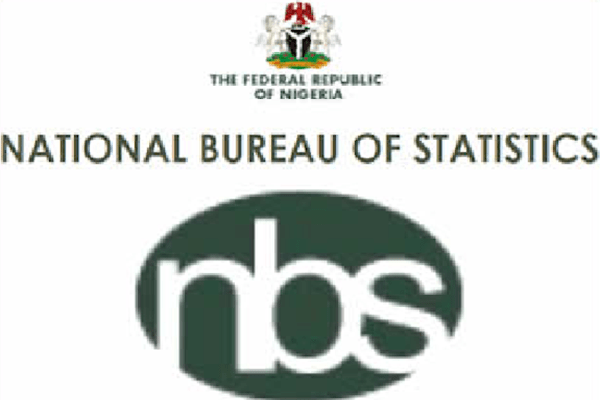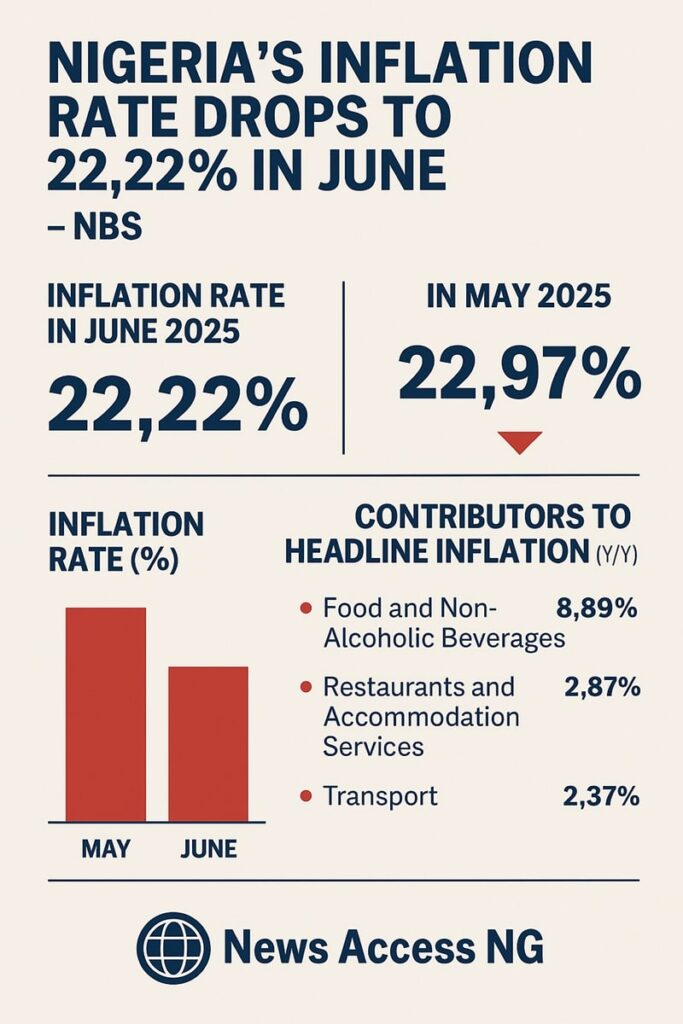
Nigeria’s headline inflation rate eased further to 22.22 percent in June 2025, marking a continued slowdown in inflationary pressures across the country, according to the latest data released by the National Bureau of Statistics (NBS).
The figures, contained in the June 2025 Consumer Price Index (CPI) and Inflation Report and made available on Wednesday in Abuja, indicate a 0.76 percent decrease compared to the 22.97 percent recorded in May 2025.
Despite the annual decline, the report showed that inflation rose slightly on a month-to-month basis. The headline inflation rate for June stood at 1.68 percent, which is 0.15 percentage points higher than the 1.53 percent recorded in May, suggesting a quicker pace of price increases within the month.
“This means that in June 2025, the rate of increase in the average price level was higher than the rate recorded in May,” the NBS noted.
The rise in the inflation index was largely driven by price increases in key categories of consumer goods and services. According to the report, Food and Non-Alcoholic Beverages, Restaurants and Accommodation Services, and Transport were the top contributors to the headline inflation rate on a year-on-year basis. On the other hand, the least contributing divisions were Recreation, Sport and Culture, Alcoholic Beverages and Tobacco, and Insurance and Financial Services.
Food inflation, a critical indicator for Nigerian households, recorded a significant decline on a year-on-year basis, standing at 21.97 percent in June 2025. This represents a sharp drop of 18.90 percentage points when compared to the 40.87 percent recorded in June 2024. The NBS attributed this decline primarily to the recent rebasing of the Consumer Price Index, which has adjusted the base year for comparison to reflect more recent economic conditions.
However, on a month-to-month basis, food inflation increased to 3.25 percent in June, rising from 2.19 percent in May. The increase was driven by price hikes in several staple food items, including green peas, fresh pepper, dried shrimps, crayfish, fresh meat, tomatoes, plantain flour, and ground pepper.

Core inflation, which excludes the prices of volatile agricultural produce and energy items, rose to 22.76 percent on a year-on-year basis in June. Month-on-month, the core inflation rate increased to 2.46 percent, up from 1.10 percent in May.
Read Also: Food prices rose in October – NBS
The report also provided new insights into the country’s inflation structure, following the introduction of newly rebased sub-indices. According to the NBS, on a month-on-month basis, the inflation rate for farm produce dropped by 13.3 percent, while goods inflation stood at 0.93 percent, down from 22.38 percent and 9.39 percent respectively in May. Meanwhile, inflation for services and energy was recorded at 3.26 percent and -11.0 percent, respectively, compared to 1.79 percent and -0.43 percent in the previous month.
On the regional front, urban inflation was higher than rural inflation. The urban inflation rate was recorded at 22.72 percent year-on-year and 2.11 percent month-on-month, indicating a 0.71 percent increase from the previous month. Rural inflation, by contrast, stood at 20.85 percent year-on-year, with a lower month-on-month figure of 0.63 percent, showing a decline from 1.83 percent in May.
A breakdown by state revealed that Borno State recorded the highest inflation rate in June on a year-on-year basis at 31.63 percent, followed by the Federal Capital Territory at 26.79 percent and Abia at 25.91 percent. The slowest inflation rates were recorded in Zamfara at 9.90 percent, Yobe at 13.51 percent, and Sokoto at 15.78 percent.
Month-on-month, Ekiti recorded the highest inflation rate at 5.39 percent, followed by Delta at 5.15 percent, and Lagos at 5.13 percent. Conversely, the slowest month-on-month inflation was recorded in Zamfara at -6.89 percent, Niger at -5.53 percent, and Plateau at -4.01 percent.
In terms of food inflation, Borno State again topped the chart with 47.40 percent, followed by Ebonyi at 30.62 percent and Bayelsa at 28.64 percent. The states with the lowest food inflation year-on-year were Katsina at 6.21 percent, Adamawa at 10.90 percent, and Sokoto at 15.25 percent.
On a month-on-month basis, food inflation was highest in Enugu at 11.90 percent, Kwara at 9.97 percent, and Rivers at 9.88 percent. The slowest increases were observed in Borno at -7.63 percent, Sokoto at -6.43 percent, and Bayelsa at -6.34 percent.
The NBS noted that the June 2025 CPI rose to 123.4, reflecting a 2-point increase from the previous month. This rise is part of the broader changes introduced through the recent rebasing of the CPI, which updated the base year from 2009 to 2024, with 2023 now serving as the reference year for expenditure patterns.
According to Adeyemi Adeniran, the Statistician-General of the Federation, the rebasing was necessary to ensure that Nigeria’s inflation metrics accurately reflect the country’s current economic realities. He explained that the process involved incorporating emerging sectors, updating household consumption baskets, and refining data collection methodologies.
For more insights and updates on Nigeria’s economy, stay tuned to News Access NG.





